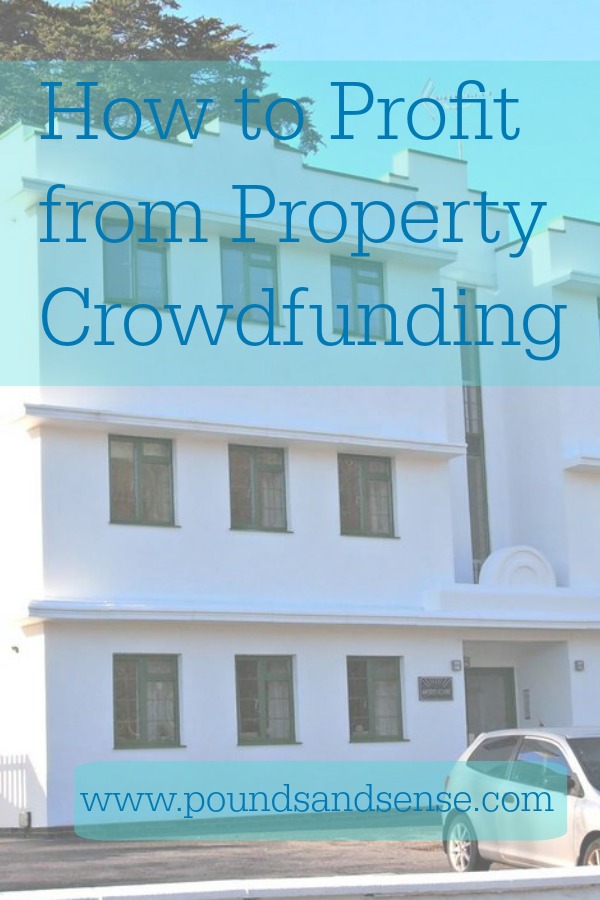How to Profit from Property Crowdfunding
Updated November 2018: Crowdfunding and crowdlending are opportunities I particularly wanted to discuss on Pounds and Sense, so I thought I would kick off by looking at the investment possibilities offered by property crowdfunding.
As ever, I have to start with a disclaimer that I am not a qualified financial adviser. I am simply talking about this topic as an interested individual who has invested this way himself. You should do your own ‘due diligence’ before investing, and never risk money you cannot afford to lose in a worst-case scenario.
Why Property Crowdfunding?
Investing in bricks and mortar has long been a favourite strategy of the wealthy. Property owners get a double benefit: rent from tenants for as long as they own the property, and – in most cases – a profit if they choose to sell.
Of course, property doesn’t come cheap. And even if you can stretch to buying a modest house or flat for investment purposes, you are taking the risk of putting all your eggs in one basket. As a result, many people of more modest means have concluded that property investment is not for them.
Crowdfunding is changing all that, however. A growing number of platforms now exist that allow ordinary folk the chance to buy a share in an investment property for as little as £50. Investors then receive a proportion of the rental income generated, and also get a share of the profit when and if the property is sold.
I now have investments via three different property crowdfunding platforms – a block of flats in Torquay in which I own a small share is pictured above – but in this post I want to focus on one platform in particular, the UK-based Property Partner. This was only launched in January 2015, and has swiftly become the UK’s largest property crowdfunding website. They have over 9,060 investors, who between them have invested over £44 million in properties across the UK. Non-UK investors are welcome to join Property Partner too, so long as the legal system in their country permits it. Unfortunately, US residents are not able to invest this way at the moment.
One big attraction of Property Partner is that they have an active secondary market. That means investors can offer part or all of their portfolio for sale at any time.
Obviously, to sell your shares in a property you will need a buyer, but Property Partner say that so long as they are priced reasonably (i.e. at or below the current official price) shares normally sell within 72 hours. By contrast, other property crowdfunding platforms such as The House Crowd and CrowdLords do not run formal secondary markets, though they say they will always help would-be sellers find a buyer if required.
Another attraction of Property Partner is that dividends are paid monthly, unlike other platforms which typically pay annually. Money from dividends builds up in your account, and you can either withdraw it or reinvest it in other properties. When you add that you can get started on Property Partner for as little as £50, it is not all that surprising to me that they have enjoyed such success.
Understanding the Risks
With all property crowdfunding platforms, it is important to understand that there is an element of risk. Clearly, your returns may be affected if occupancy falls or there is a major issue affecting the property (e.g. a fire). Your money is not as safe as with a UK bank savings account (although of course the potential returns are much better).
It is therefore important not to put all your eggs in one basket. As mentioned, I have investments with three different property crowdfunding platforms, and within each platform I am invested in several different properties as well. I have only had one investment fail – a highly speculative development venture – and fortunately I only had the minimum amount invested in that.
On the positive side, I have made several thousand pounds profit from my property crowdfunding investments to date, and have been pleased with the net rate of return. With Property Partner alone I have around £5000 invested and made £500 profit in the last year or about a 10% return (allowing for both rental income and capital appreciation).
Clearly, I’m not saying that everyone should invest in Property Partner – that depends on your personal circumstances and investment goals, and you should always take professional advice if you have any doubts before investing. But if you are looking for a property crowdfunding platform to invest with, in my view they should definitely be at or near the top of your list.
Up to £750 Sign-up Bonus!
As an existing Property Partner investor, I can offer a special bonus for anyone joining via my link. If you click through this special invitation link, sign up and invest a minimum of £2,000 within 60 days, you will receive an extra bonus as follows (and so will I):
£2,000 – £30
£10,000 – £150
£20,000 – £300
£50,000 – £750
Not only that, once you are an investor with Property Partner, even if you only start with £250, you will be able to offer the same bonus to your friends and relatives and earn commission yourself. There is no limit to the number of people you can introduce through this scheme.
Obviously, this is a generous promotional offer by Property Partner and I assume it won’t be available forever. If you want to take advantage, therefore, don’t wait too long. I will remove this information if/when I hear the offer is no longer valid.
I do hope you have found this post on property crowdfunding of interest. As I mentioned earlier, this subject (and crowdfunding/lending in general) is one I intend to return to on Pounds and Sense regularly in future.
- Of course, property crowdfunding is just one type of investment opportunity. If you’d like to learn more about investing in stocks and shares, check out this post on the excellent Financial Expert website.
Good luck, and if you have any comments or questions about property crowdfunding and/or Property Partner, please do post them below.



January 31, 2017 @ 5:48 pm
Must admit I knew absolutely nothing about property crowdfunding before your post about it… learn something new everyday as they say! 🙂
January 31, 2017 @ 6:29 pm
Thanks, Caz. Glad you found my post interesting!
January 31, 2017 @ 7:18 pm
Great post, I’ve not used Property Partner yet but have been using PropertyMoose which also has an active secondary market. So far made some decent returns, however I have been lucky because some of the properties have had difficulty with tenants etc…
January 31, 2017 @ 8:07 pm
Thanks, Ben. I’ve not used Property Moose, although I’ve heard good things about it. The platform I have most money invested in is actually The House Crowd. They have had a few problems with non-paying tenants too, and have altered their property investment strategy a bit as a result. I haven’t lost any money from this, but returns have been lower than expected on the properties in question.
Recently THC has been offering more in the way of short-term development loans, typically paying around 10% a year. I shall say more about this in a future post.
February 3, 2017 @ 12:44 pm
Wow, this is something I did now know about. Sounds like something I’d be really interested in once all my loans are paid off (which will definitely be this year)! 🙂
February 3, 2017 @ 1:19 pm
Thanks, Vicky. Yes, definitely well worth considering. Good luck paying off those loans!
February 13, 2017 @ 11:15 pm
Very interesting post! Still saving towards my own place at the moment, but I would consider this for investing in the future. A 10% return is pretty tempting!
February 14, 2017 @ 9:36 pm
Yes, in these days of returns of under 1% from most bank savings accounts, property crowdfunding sites are definitely worth checking out. Just be sure to spread your investments across a range of projects to minimize the risks. Thanks for the comment 🙂